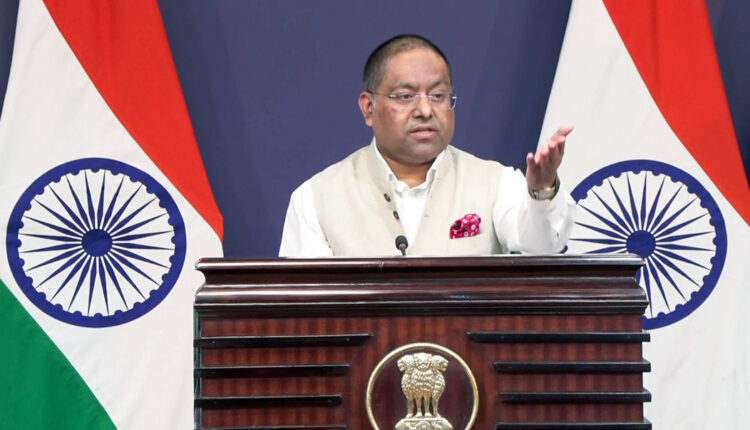“Global community recognises Pakistan as epicentre of terrorism”: MEA
The international community has expressed clear solidarity with India and acknowledged that the tourists targeted in the Pahalgam attack were victims of terrorism, Ministry of External Affairs (MEA) spokesperson Randhir Jaiswal said on Tuesday. He stressed that the epicentre of terrorism lies across the border in Pakistan.
During a press briefing, Jaiswal said that numerous foreign leaders have expressed support for India’s right to defend itself and protect its citizens. “There is widespread understanding in the world that Indian tourists were the victims of terrorism at Pahalgam and that the epicentre of terrorism is across the border in Pakistan. A number of foreign leaders, in their conversations with Indian counterparts, recognised India’s right to defend itself and protect its people,” he stated.
Jaiswal also referred to the United Nations Security Council’s press statement dated April 25, which emphasised the need to hold accountable those responsible for acts of terrorism. “I draw your attention to the UN Security Council press statement of 25th April, which states that ‘there is a need to uphold perpetrators, organisers, financiers and sponsors of this reprehensible act of terrorism accountable and bring them to justice.’ They further stressed that those responsible for these killings should be held accountable,” he added.
Addressing the status of the Indus Water Treaty (IWT), Jaiswal announced that the treaty has been put in abeyance following a decision by the Cabinet Committee on Security (CCS). He explained that while the treaty was originally founded on principles of goodwill and friendship, Pakistan had violated those principles through decades of promoting cross-border terrorism.
“After the CCS decision, the Indus Water Treaty has been put in abeyance. The IWT was concluded in the spirit of goodwill and friendship as specified in the preamble of the treaty. However, Pakistan has held these principles in abeyance by its promotion of cross-border terrorism for several decades now. As per the CCS decision, India will keep the treaty in abeyance until Pakistan credibly and irrevocably abjures its support for cross-border terrorism,” Jaiswal said. He also noted that evolving factors such as climate change, demographic shifts, and technological developments have altered the regional landscape.
Responding to statements from Pakistan’s Foreign Minister Ishaq Dar, Jaiswal dismissed Islamabad’s justification for retaliatory strikes following India’s cross-border attacks on May 7. “We have seen the statement made by the Pakistani side. That a nation which has nurtured terrorism on an industrial scale should think that it can escape the consequences is fooling itself. The terrorist infrastructure sites that India destroyed were responsible not only for the deaths of Indians but also of many other innocents around the world. There is now a new normal. The sooner Pakistan gets used to it, the better,” he said.
Pakistan’s Foreign Minister had earlier referred to India’s strikes as a “war” and a “wishful attempt to establish its hegemony,” claiming that Islamabad had no choice but to respond in “self-defence.” Dar also asserted confidence in Pakistan’s conventional military capabilities, stating they were sufficient to defeat India both in the air and on the ground.



